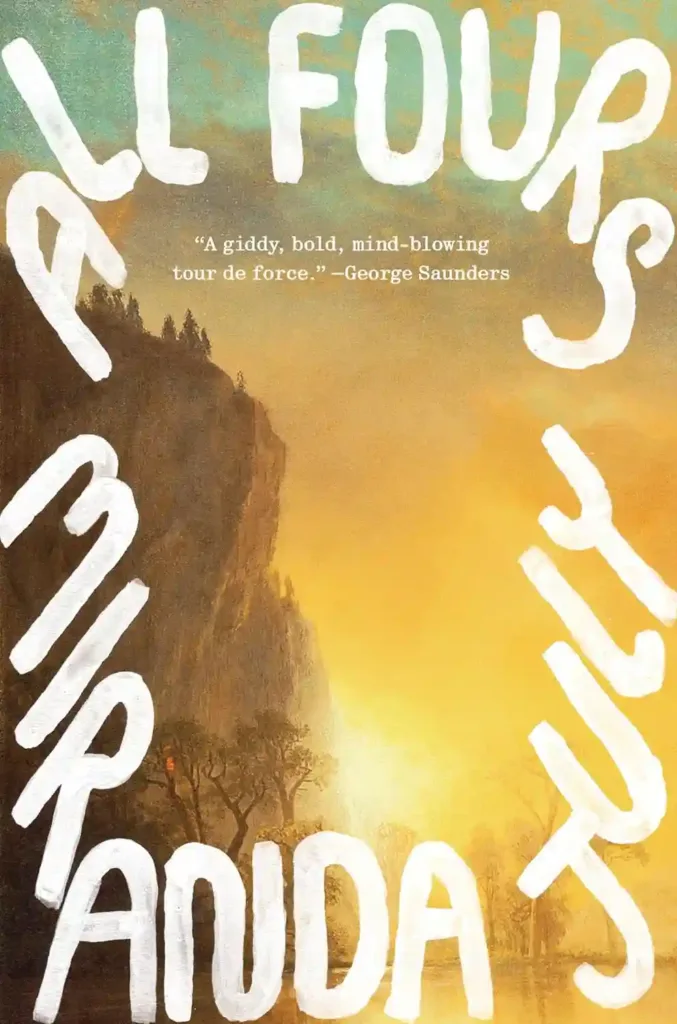Book Summary of All Fours
Through her book All Fours Miranda July shares an electrifying narrative that explores self-discovery sexuality and female empowerment. The story starts with an artist who becomes somewhat famous as she declares her plan to travel from Los Angeles to New York by car for a supposed project although she may actually want to flee from an undefined distress. After leaving her husband and child behind her she gets off the highway twenty minutes into her trip and checks into a nondescript motel.
The journey that unfolds is not the anticipated cross-country road trip but a bizarrely funny exploration of personal reinvention. The unexpected stop becomes her refuge for discovering a completely new way of existing. Through her interactions with strangers and the unexpected significance of those encounters she starts to redefine her identity beyond the roles of mother, wife, artist and woman.
The story examines a state of being stuck and the decision of remaining in that state temporarily to discover possible outcomes of this stillness. All Fours combines fearlessness and humor with disarmingly tender moments while exploring sexual energy and existential questions. The book poses questions regarding genuine self-understanding while questioning if an authentic self can exist beyond mere performance.
Author Intro
Miranda July
Miranda July is a true creative polymath—filmmaker, writer, artist, and performer—known for her distinctively quirky and emotionally raw storytelling. From her breakout film Me and You and Everyone We Know to her short story collection No One Belongs Here More Than You, July has made a career of exploring the vulnerability, awkwardness, and profound beauty of everyday human connection. Her work is often surreal, sometimes absurd, but always grounded in deep emotional truth. With All Fours, July continues her tradition of pushing boundaries—social, emotional, and narrative—to bring us a novel that’s as unconventional as it is intimate.
Book Reviews of All Fours
This book is bonkers—in the best way. All Fours is Miranda July at her most Miranda July: weird, sexy, uncomfortable, and oddly profound. I loved the way it flips the road trip narrative on its head. It’s not about distance, it’s about depth. Our heroine doesn’t get far physically, but emotionally? She excavates everything. Her desires, her identity, her confusion—it’s all on the table in this funny, fiercely vulnerable spiral of a story. Some moments are laugh-out-loud absurd, others cut deep with truth. It’s not a book for everyone, but if you’re a fan of stories that aren’t afraid to get messy and intimate, this one will absolutely speak to you.
I wanted to like All Fours more than I did. Miranda July is undeniably brilliant, and the prose is razor-sharp in places. But the plot—or lack thereof—left me frustrated. There’s a lot of internal dialogue, self-reflection, and sexual tension, but it often feels like it’s meandering without a destination. The main character’s decisions are fascinating but also occasionally exasperating. That said, there are flashes of insight that are genuinely moving. If you go into this expecting a traditional arc, you’ll be disappointed. But if you’re okay floating in July’s surreal, introspective world, you’ll find some striking moments of honesty.
Reading All Fours felt like peeking into someone else’s emotional diary—a really bold, unfiltered one. The main character’s need to break out of her life, even if just for a motel room in the middle of nowhere, hit me hard. As a woman and a mom, I felt the tension she was carrying. The guilt, the longing, the urge to just disappear and be someone else for a while. Miranda July captures that delicate, taboo space between responsibility and desire so beautifully. It’s a weird book, for sure, but I felt seen in a way I didn’t expect. It made me laugh, it made me think, and it made me ache a little too.
All Fours isn’t just a novel—it’s a meditation on transformation. July presents a protagonist who abandons her life not out of boredom or drama, but because something inside her whispers that reinvention is possible in the quietest of places. The motel becomes a metaphor for liminal space—neither here nor there—where identity is both paused and in flux. The book is sensual, unpredictable, and rich in psychological complexity. It dares to ask: who are we when we remove all the signs that tell us who we’re supposed to be? Not every thread resolves, but maybe that’s the point. Some books tie up neatly. This one dares to unravel.





